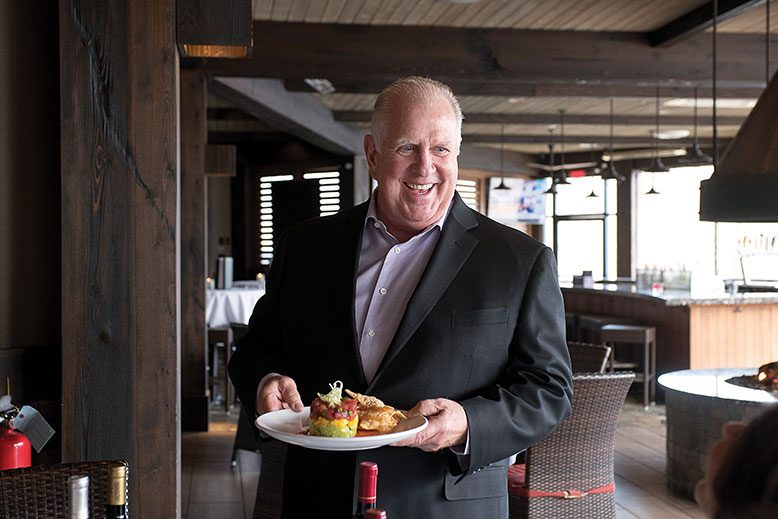
Like many people, Bob Platzer loves the famous scene in Goodfellas where Ray Liotta leads his girlfriend through the bustling kitchen of the Copacabana to a table by the stage. Unlike most people, what Platzer finds alluring is not the mobster’s power trip, but the kitchen itself, “the hollering, the hustling, crazy busy-ness.”
It reminds him of his own wide-eyed entry into the business as a teenage dishwasher, busboy and carhop at the fabled Rickshaw Inn in Cherry Hill, frequented by Rat Pack-era stars headlining at the Latin Casino next door.
At 67, Platzer looks back on those days fondly. As founder and CEO of the PJW Restaurant Group, he owns 22 restaurants: PJ Whelihan’s (Cherry Hill, Haddonfield, Maple Shade, Medford Lakes, Sewell, and 11 in and around Philadelphia); the craft-beer pub Pour House (Westmont and two outside Philly); Treno Pizza Bar in Westmont; ChopHouse in Gibbsboro; and Central Taco, opening in July in Haddon Township.
Growing up in Pennsauken, the third of seven children, Platzer thought of eating out as otherwordly. “My father had one job his entire life,” he says. “He was the warehouse manager for a big stationery company. At the Rickshaw, I’d see kids I went to school with coming in with their families on a Tuesday night, eating lobster tail. My family, we didn’t go out unless it was a special occasion. I told myself, Someday I want to go out to eat like that, and if I do, I want to own the restaurant.”
Platzer liked the physical labor and mental discipline of restaurant work. Moreover, “you got paid every night.” The ownership goal was inspired by his admiration for his bosses, particularly Rickshaw owner Dom Vitese, “the ultimate gentleman. He’d walk around, shake hands all night. It was an honor when Dom stopped at your table. And he was nice to the staff. I really idolized the guy.”
By age 27, Platzer had worked his way up to bartender and line cook. In the summer of 1979 he went out on his own for the first time, creating the food concession for a basement bar in Margate called the Greenhouse.
“I made money hand over fist—seven sandwiches, that was it,” he says. At high tide under a full moon, the basement would flood, and the young patrons would sit in several inches of water “and pretend to row the bar away.” He did other things, but by 1983, he was married and owned nothing. That year, he heard about a ramshackle bar for sale in the Poconos and bought it. He called it Platz’s and nearly blew himself up once when he lit the pilot light on the grill, not realizing the gas had been on awhile. Living upstairs, he and his family slowly fixed up the place. Platzer tried to revive the fine-dining panache of the Rickshaw. People liked the food, but he was going broke.
“A guy came in and said, ‘White tablecloth is on the way out. Go casual. Charge less.’ So I did. And darn if he wasn’t right. He also said, ‘Don’t open a second restaurant.’ I didn’t listen to that part.”
In 1993, in Allentown, Pennsylvania, Platzer opened the first PJ Whelihan’s (named for his maternal grandfather, who “was quite the pub person”). It did well. Wanting to expand, he approached owners of mom-and-pop eateries who had no debt and wanted to sell. He put a little money down on a balloon mortgage the owners secured. Remaking the restaurant as a PJ, he made his payments, turned it profitable and paid off the balance before the balloon came due. In a few years, “I made four restaurants successful, and I hadn’t been to a bank. Once I showed I could be successful, banks lent me money. Pay your bills, show growth, and everybody wants to lend you money.”
Beginning in 2004, when he owned eight restaurants, Platzer began building a team, hiring a chief operating officer and, in 2005, a chief financial officer. Though he has changed the concepts of two restaurants that weren’t clicking, he has never closed one. “About 60 percent of our leaders are homegrown,” he says. “That’s why I didn’t stop expanding. Because I knew other people wanted to grow also. We did $85 million in sales in 2017. I expect to be over $90 million this year.”

Couldn’t happen to a better guy. Salt of the earth, good for you Bobby!